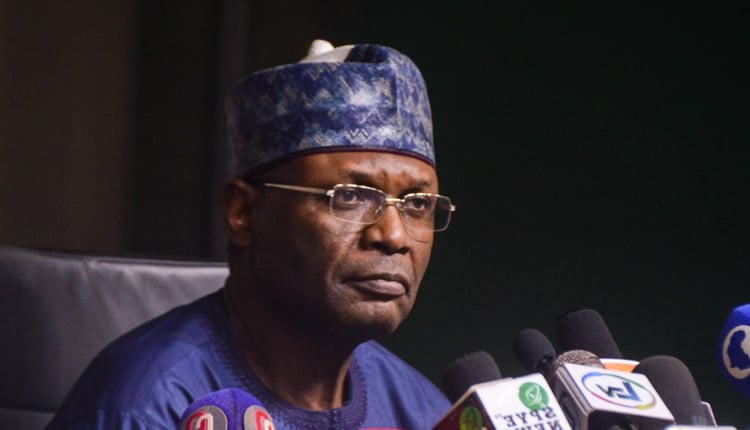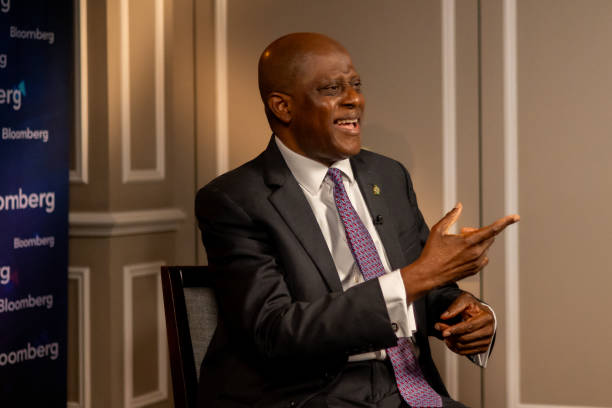President Bola Ahmed Tinubu has officially accepted the exit of Professor Mahmood Yakubu as Chairman of the Independent National Electoral Commission (INEC), following the completion of his second and final term in office.
Yakubu handed over to May Agbamuche-Mbu, a seasoned legal expert and the most senior national commissioner, who will now serve as Acting Chairman pending the appointment of a substantive successor.
According to the Presidency, Tinubu will announce Yakubu’s replacement after Thursday’s Council of State meeting in Abuja, where he is expected to present a shortlist of nominees for consideration.
In recognition of Yakubu’s decade-long service to Nigeria’s democracy, the President conferred on him the national honour of *Commander of the Order of the Niger (CON).*
A statement by the President’s Special Adviser on Information and Strategy, Bayo Onanuga, quoted Tinubu as commending the outgoing INEC boss for “his commitment to conducting free and fair elections” throughout his tenure.
Yakubu, in a letter dated October 3, 2025, expressed gratitude to President Tinubu for the opportunity to serve, adding that his decision to step aside was in accordance with Section 306 (1) and (2) of the 1999 Constitution.
During his tenure, Yakubu introduced several innovations to strengthen Nigeria’s electoral process, including the Bimodal Voter Accreditation System (BVAS) and the INEC Results Viewing Portal, both of which improved transparency and voter verification. He also institutionalised continuous voter registration, promoted inclusion for persons with disabilities, and enhanced polling logistics through the Election Monitoring and Support Centre.
Despite these achievements, his leadership faced criticism over the 2023 general elections, which were marred by technical glitches and delayed result transmission.
Yakubu, who first assumed office in November 2015 following his appointment by former President Muhammadu Buhari, became the first INEC Chairman in Nigeria’s history to serve two full terms.
Meanwhile, legal experts have expressed differing views on the process of appointing a new INEC Chairman.
Senior Advocate of Nigeria (SAN) Ifedayo Adedipe dismissed public anxiety over the President’s role in the appointment, describing it as a distraction. “Was it not Jonathan that appointed Professor Jega? Didn’t Jonathan lose the election? The issue is not who appoints the chairman but how we conduct ourselves during elections,” he argued.
Another SAN, Adedayo Adedeji, affirmed that the President is constitutionally empowered to make the appointment, subject to Senate confirmation. He, however, called for broader consultation to ensure credibility and transparency.
On his part, Wale Balogun, SAN, stressed the need to “firm up the process” to ensure a credible appointment, noting that the existing checks and balances must be strengthened to guarantee electoral independence.
As Yakubu bowed out, he outlined ongoing preparations for upcoming elections — including the Anambra governorship poll in November 2025, the FCT Area Council elections in February 2026, and the Ekiti and Osun governorship elections later that year — as well as early groundwork for the 2027 general elections.
He presented two publications documenting INEC’s work during his tenure: *“Election Management in Nigeria 2015–2025”* and *“Innovations in Electoral Technology 2015–2025.”*
May Agbamuche-Mbu, now Acting INEC Chairman, is a legal practitioner with over 30 years of experience and a background in both Nigerian and international law. Appointed National Commissioner in 2016, she is widely regarded as a reform-minded administrator and expert in alternative dispute resolution.
In a related development, Speaker of the House of Representatives, Tajudeen Abbas, reaffirmed the legislature’s commitment to electoral, security, and economic reforms ahead of the 2027 polls.
Addressing lawmakers as the House resumed from recess, Abbas said the chamber would prioritise the completion of constitutional amendments and the passage of the Electoral Act Amendment Bill to strengthen transparency, reduce election-related litigation, and enhance inclusion.
He also called for renewed debate on state policing, devolution of powers, and gender inclusion through the *Reserved Seats Bill for Women*, adding that “how we vote on this bill will shape how history and our daughters remember us.”
The Speaker further emphasised the need for robust oversight and collaboration with the executive to consolidate the gains of President Tinubu’s Renewed Hope Agenda, aimed at stabilising the economy, improving security, and driving inclusive growth.





